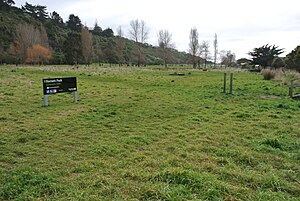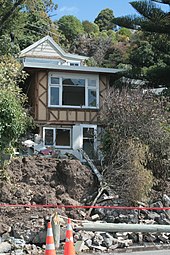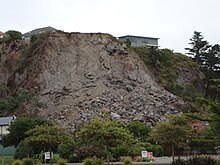Redcliffs
 From Wikipedia - Reading time: 11 min
From Wikipedia - Reading time: 11 min
Redcliffs | |
|---|---|
 Barnett Park | |
 | |
| Coordinates: 43°33′47″S 172°43′52″E / 43.563°S 172.731°E | |
| Country | New Zealand |
| City | Christchurch |
| Local authority | Christchurch City Council |
| Electoral ward | Heathcote |
| Community board | Waihoro Spreydon-Cashmere-Heathcote |
| Area | |
| • Land | 185 ha (457 acres) |
| Population (June 2024)[2] | |
• Total | 2,180 |
| (Avon Heathcote Estuary / Ihutai) | ||
| Mount Pleasant |
|
|
| Heathcote Valley | (Port Hills) | Moncks Bay |
Redcliffs (Māori: Te Raekura)[3] is an outer coastal suburb of Christchurch, Canterbury, New Zealand.
History
[edit]The area of Redcliffs was first populated by humans about 700 years ago. In the 14th century, large groups of Māori, initially the Waitaha people and then the Ngāti Māmoe tribe, settled in the area. The Ngāi Tahu eventually displaced Ngāti Māmoe and were still living in the area when the first Europeans arrived.[4]
The Māori name for the mudflats near the suburb is Ohikaparuparu, it is an important shellfish gathering site for Māori.[5]
The Moa Bone Point Cave (Te Ana o Hineraki) in Redcliffs was excavated under the direction of Julius von Haast in 1872, and numerous artefacts were found.[6] Many further investigations have been undertaken since that time. Artefacts found included moa bones and egg shells, bones of seals, birds and fish, shellfish and many Māori taonga. This suggests that Moa Bone Point Cave was used as shelter by the first Māori people but also used as a place to store valuable items.[7]
Moncks Cave is another smaller cave located in Redcliffs. It was discovered by road workers in 1889, and is considered to be one of the greatest archaeological sites in New Zealand because of the evidence that it has provided of early Māori occupation, including wooden artefacts.[8][9]
Location
[edit]The suburb is most directly accessed from the city centre by a causeway that crosses the Avon Heathcote Estuary and is the suburb immediately before Sumner. Alternatively, Redcliffs can be accessed through McCormack's Bay Road, which circles the perimeter of the Avon Heathcote Estuary.[10] The coastal road from Redcliffs to Sumner allows for further access to the port and suburb of Lyttelton and the Port Hills, and an alternative—if long—route to the city centre.
Geology
[edit]Redcliffs is characterised by rocky, hilly geography and has many natural caves in its sides. The domineering cliffs of Redcliffs are a snapshot of the region's volcanic origins. The cliffs are tinged with veins of red tephra, and composed of 'A'ā lava flows; the suburb draws its name from this the most notable of its physical features.[11]
Demographics
[edit]Redcliffs covers 1.85 km2 (0.71 sq mi).[1] It had an estimated population of 2,180 as of June 2024,[2] with a population density of 1,178 people per km2.
| Year | Pop. | ±% p.a. |
|---|---|---|
| 2006 | 2,079 | — |
| 2013 | 1,776 | −2.23% |
| 2018 | 1,971 | +2.11% |
| Source: [12] | ||
Redcliffs had a population of 1,971 at the 2018 New Zealand census, an increase of 195 people (11.0%) since the 2013 census, and a decrease of 108 people (−5.2%) since the 2006 census. There were 822 households, comprising 933 males and 1,035 females, giving a sex ratio of 0.9 males per female. The median age was 49.3 years (compared with 37.4 years nationally), with 276 people (14.0%) aged under 15 years, 285 (14.5%) aged 15 to 29, 957 (48.6%) aged 30 to 64, and 453 (23.0%) aged 65 or older.
Ethnicities were 93.2% European/Pākehā, 7.3% Māori, 0.8% Pasifika, 4.3% Asian, and 2.7% other ethnicities. People may identify with more than one ethnicity.
The percentage of people born overseas was 24.4, compared with 27.1% nationally.
Although some people chose not to answer the census's question about religious affiliation, 54.3% had no religion, 35.5% were Christian, 0.2% had Māori religious beliefs, 0.8% were Hindu, 1.1% were Muslim, 0.8% were Buddhist and 1.7% had other religions.
Of those at least 15 years old, 615 (36.3%) people had a bachelor's or higher degree, and 144 (8.5%) people had no formal qualifications. The median income was $43,200, compared with $31,800 nationally. 483 people (28.5%) earned over $70,000 compared to 17.2% nationally. The employment status of those at least 15 was that 783 (46.2%) people were employed full-time, 291 (17.2%) were part-time, and 39 (2.3%) were unemployed.[12]
The suburb is affluent by New Zealand standards and property values are relatively high, with the average house costing NZ$450,000 in 2006.[13] Redcliffs has a significant number of baby boomers.
Recreation
[edit]Barnett Park, open to public access, and a product of the earliest council recreation planning in the wider Christchurch region, is located in Redcliffs.[10] The suburb also hosts a bowling green, and a smaller park adjacent to the estuary which bears the suburb's name, Redcliffs Park.

2011 Christchurch earthquake
[edit]
In contrast to the September 2010 earthquake, Redcliffs and the surrounding hills suffered significant damage in the 22 February 2011 earthquake. Dozens of houses were deemed unliveable and hundreds more damaged. There was a large scale evacuation of several streets in Redcliffs at 10pm on Thursday, 24 February after some cliffs surrounding Redcliffs were deemed unstable. The following morning, a few streets or partial streets remained cordoned off but many people were able to return to their homes immediately.[14][15]
By 7 March, detailed geotechnical inspections of the affected land inside the remaining cordons began with a view to removing them. They were removed on 8 March.[16]
Redcliffs citizens launched a local information centre on 26 February, followed by a regular newsletter from 27 February,[17] followed by two support websites.[18]
On 2 March, Redcliffs resident Peter Hyde launched a viral call[19] to encourage more support, especially key supplies and information, for the worst affected Eastern suburbs of Christchurch. In particular those to the north of Redcliffs such as Parklands, Aranui, Bromley, Avonside, Bexley and New Brighton.
Redcliffs School
[edit]Te Raekura Redcliffs School is a full primary school catering for years 1 to 8.[20] It had a roll of 225 as of August 2024.[21]
The school opened in 1907.[22] It was temporarily relocated to Van Asch Deaf Education Centre, 4.5 kilometres (2.8 mi) from the original Main Road site, after the June 2011 aftershock. This decision came after concerns of the safety of pupils as the cliffs behind the school became unstable.[23] In 2015 and 2016, Redcliffs School faced the risk of closure due to the risk of further disruption. After community backlash, it was decided to build a new site in Redcliffs Park, across the road from the original site. The new site was opened in June 2020.[24][25]
References
[edit]- ^ a b "ArcGIS Web Application". statsnz.maps.arcgis.com. Retrieved 22 December 2023.
- ^ a b "Aotearoa Data Explorer". Statistics New Zealand. Retrieved 26 October 2024.
- ^ Taylor, W.A (1952). Lore and history of the South Island Māori. Christchurch, New Zealand. p. 49.
{{cite book}}: CS1 maint: location missing publisher (link) - ^ "About Redcliffs » Redcliffs Residents Association". redcliffs.org.nz. Retrieved 30 September 2019.
- ^ Tau, T.M; Goodall, A.; Palmer, D. (1990). "Te Whakatau Kaupapa: Ngai Tahu resource management strategy for the Canterbury Region". Aoraki Press. Wellington, New Zealand. pp. 5–24.
- ^ "Where the Maori trod". Taranaki Daily News. 4 January 1933. p. 8 – via Papers Past.
- ^ "Te Ana o Hineraki – Moa Bone Point Cave". my.christchurchcitylibraries.com. Retrieved 30 September 2019.
- ^ "Moncks Cave treasures". The Press. 7 March 1987. p. 22. Retrieved 3 May 2024 – via Papers Past.
- ^ "Redcliffs". New Zealand Heritage List/Rārangi Kōrero. Heritage New Zealand.
- ^ a b CCC, 1984
- ^ McKinnon, Malcolm (24 November 2008). "Place names: Redcliffs". Te Ara - the Encyclopedia of New Zealand. Retrieved 2 September 2024.
- ^ a b "Statistical area 1 dataset for 2018 Census". Statistics New Zealand. March 2020. Redcliffs (332100). 2018 Census place summary: Redcliffs
- ^ Real Estate Institute of New Zealand
- ^ "Television | Scoop News". Scoop.co.nz. Retrieved 14 August 2013.
- ^ "New Zealand earthquake: Hopes fade for 200 missing". BBC News. 24 February 2011. Retrieved 14 August 2013.
- ^ Hyde, Peter. "Tuesday March 8, 6pm". Redcliffs Community NewsSheet. Webcentre Ltd. Retrieved 8 March 2011.
- ^ Hyde, Peter. "Redcliffs Community NewsSheet" (PDF). Redcliffs Community NewsSheet #1. Webcentre Ltd.
- ^ "Redcliffs Community NewsSheet – Webcentre Ltd". Webcentre.co.nz. Retrieved 14 August 2013.
- ^ Hyde, Peter. "Christchurch Quake – More Action Needed in Eastern Suburbs Right Now". Webcentre.co.uk.
- ^ Education Counts: Te Raekura Redcliffs School
- ^ "New Zealand Schools Directory". New Zealand Ministry of Education. Retrieved 17 September 2024.
- ^ "History". Te Raekura Redcliffs School. 7 June 2019.
- ^ "Christchurch's Redcliffs School move to be fast tracked". Stuff. Retrieved 30 September 2019.
- ^ "Redcliffs School returns home after nine years". Stuff. 21 June 2020. Retrieved 1 July 2020.
- ^ Admin. "Principal's Welcome". Redcliffs School. Retrieved 30 September 2019.
External links
[edit]- Kirby, Georgia (2017). Redcliffs Archaeological History and Material Culture (MA thesis). University of Otago. Retrieved 3 May 2024.
- Redcliffs Residents Association
 KSF
KSF